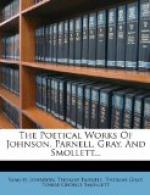Two months after his return to England, his father died, somewhat impoverished by improvidence. Gray, thinking himself too poor to study the law, sent his mother and a maiden sister to reside at Stoke, near Windsor, and retired to Peterhouse, Cambridge, where he resumed his classical and poetical pursuits. To West, who by this time was declining in health, he sent part of “Agrippina,” a tragedy he had commenced. West objected to the length and prosiness of Agrippina’s speeches. These were afterwards altered by Mason, in accordance with West’s suggestions; but Gray was discouraged, and has left “Agrippina” a Torso. The subject was unpleasing. To have treated adequately the character of Nero, would have required more than the genius of Gray; and the language of the fragment is distinguished rather by rhetorical burnish than by poetical spirit and heat. We have not thought it necessary to reprint it, nor several besides of the fragmentary and inferior productions of this poet, which Mason, too, thought proper to omit.
Gray now plunged into the mare magnum of classical literature. With greater energy and exclusiveness than before, he read Thucydides, Theocritus, and Anacreon; he translated parts of Propertius, and he wrote a heroic epistle in Latin, after the manner of Ovid, and a Greek epigram. This last he communicated to West, who was now in Hertfordshire, waiting the approach of the Angel of Death. To the same dear friend he sent his “Ode to Spring,” which he had written under his mother’s roof at Stoke. He was too late. West was dead before it arrived. This amiable and gifted person, who was thought by many superior in natural genius to his friend, and whose name is for ever connected with that of Gray, expired on the 1st of June 1742, and now reposes in the chancel of Hatfield Church. We strongly suspect that it was he whom Gray had in his eye in the close of his “Elegy.”
Autumn has often been thought propitious to genius, especially when its tender sun-light is still further sweetened and saddened by the joy of grief. In the autumn of this year, Gray, who was peculiarly susceptible to skiey influences, wrote some of his best poetry—his “Hymn to Adversity,” his “Distant Prospect of Eton College,” and commenced his “Elegy written in a Country Churchyard.” A Sonnet in English, and the Apostrophe which opens the fourth book of his “De Principiis Cogitandi,” bore testimony to his esteem for the character and his regret for the premature loss of Richard West.
To Cambridge Gray seems to have had little attachment; but partly from the smallness of his income, and partly from the access he had to its libraries, he was found there to the last, constantly complaining, and always continuing, like the statue of a murmurer. In the winter of 1742 he was admitted Bachelor of Civil Law; and in acknowledgment of the honour of the admission, began an “Address to Ignorance,” which it is no great loss to his fame that he never finished. Hazlitt completed what appears to have been Gray’s design in that admirable and searching paper of his, entitled, “The Ignorance of the Learned,” in which he shows how ill mere learning supplies the want of common sense and practical knowledge, as well as of talent and genius.




